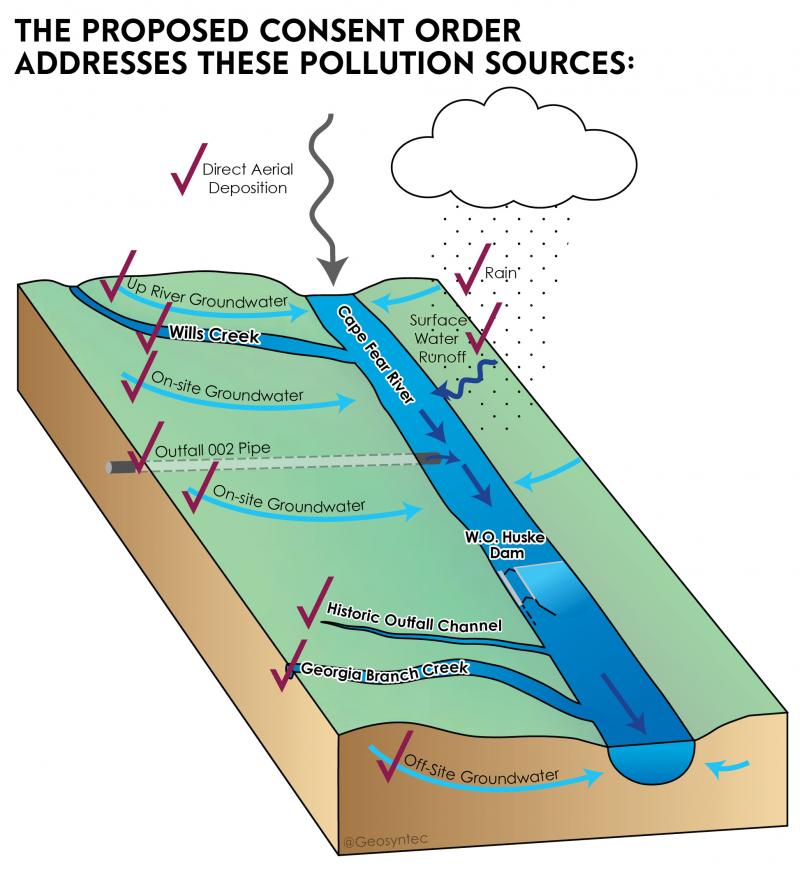SELC Op-ed: Why we support the Chemours consent order
Chemours’ main source of pollution to surface water, groundwater, and drinking wells will be cut by at least 92% by the end of 2018 and by at least 99% by the end of 2019, along with other reductions.Pollution Sources Addressed
Senior Attorney Geoff Gisler and Cape Fear Riverkeeper Kemp Burdette laid out their case for settlement over GenX contamination in a piece published this week in the Wilmington Star-News. Their letter addresses the recent consent order signed with Chemours to end GenX pollution in the Cape Fear Riverbasin. Since it was finalized, questions have come up about the implications of the agreement, despite its many merits. SELC attorneys and Cape Fear River Watch developed a detailed Q&A to address some of the questions heard often since the order was announced. They also produced an annotated version of the order to provide more detail on the agreement.
To further discuss the order, SELC attorneys and Burdette will be attending a public event tonight at 6:30 p.m. on the campus of the University of North Carolina, Wilmington.
For Cape Fear River Watch, Wilmington is our home. We and our families drank contaminated water and we share the worries about what GenX and similar chemicals have done to our health. We hear the questions raised about the proposed consent order reached as a result of our lawsuits and we understand the concerns.
Here’s why Cape Fear River Watch believes this is the best path forward:
It requires Chemours to do as much as possible, as quickly as possible, to stop polluting our air and water. It will result in a cleaner Cape Fear River in the very near future. That means that the water going into public drinking water utilities will be cleaner and safer. This step is vitally important to our families and our community.
The order requires Chemours to immediately reduce its pollution. When fully implemented, the order will nearly eliminate pollution from the facility. Chemours’ air pollution — a main source of pollution to surface water, groundwater and drinking well water — will be reduced by at least 92 percent by the end of this year and by at least 99 percent by the end of 2019. The order also sets an aggressive schedule for Chemours to, with oversight by the Department of Envrionmental Quality, Cape Fear River Watch and the Southern Environmental Law Center, eliminate other sources of pollution into the Cape Fear River and groundwater. If Chemours doesn’t do what it is required to do and when it is required to do it, it has to pay significant penalties.
In addition to halting the pollution from its facility, Chemours must fund health studies of at least five PFAS. Chemours must also develop testing protocols for all PFAS in its facility’s stormwater and waste streams so the compounds can be detected and better understood. As a result, everyone will learn more about these chemicals and it will be easier to detect them.
As required by the N.C. General Assembly, the order also requires Chemours to provide replacement drinking water supplies for any party (e.g., household, business, school, or public building) with a contaminated drinking water well, either by connection to a public utility or by provision of a filtration system. The order sets new standards for when Chemours must provide the filters to those who must depend on their wells for drinking water — significantly expanding the number of filter recipients.
Also, the order does not release DuPont from liability. Because the order is focused on stopping ongoing pollution and cleaning up contamination at Chemours’ site, it is limited to Chemours. It does not release DuPont from responsibility for the decades it polluted our air and water.
It does not put an end to the other ongoing lawsuits against Chemours and DuPont, which are based on entirely different laws. It does not, and could not, provide the sort of compensation sought in those other lawsuits.
Nothing in the order releases Chemours from liability to others such as the Cape Fear Public Utility Authority or our neighbors who are represented in lawsuits against the company. Utility lawsuits against Chemours over water treatment upgrades continue. Class action lawsuits against Chemours over the harm done to people’s health and property go forward.
Those separate lawsuits are the only avenue for the utilities and others to receive the damages they seek. If those types of damages were obtained by the state through an enforcement action, the N.C. Constitution would require the money to go to public schools. For water utilities and other plaintiffs to receive all they are seeking from Chemours and DuPont, their cases must be kept separate from the order.
The order isn’t perfect, settlement agreements never are. Yet it represents the most meaningful action to date to stop Chemours’ pollution, action achieved without years of litigation and considerable delay. The order will ensure that, as other litigation goes forward to right Chemours’ and DuPont’s many wrongs, Chemours will not continue to pollute. And we will be there each step of the way to make sure it does not. Cape Fear River Watch has been fighting for a clean river and for the health of our community since its founding. The proposed order represents the next step in those efforts, but certainly not the last.

